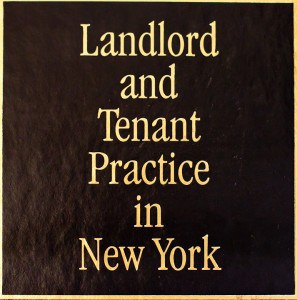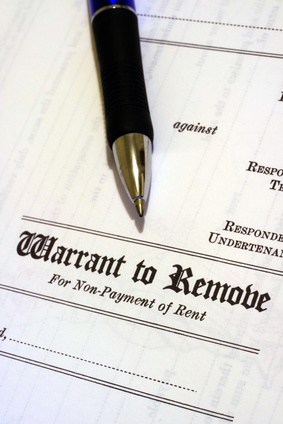 Notice of Termination – A notification, pursuant to one of several sections of the Real Property Law or the Real Property Actions and Proceedings Law, by a landlord to a tenant, or by a tenant to a landlord, that either elects to terminate either a month-to-month tenancy or a tenancy at will. The notification must be made at least 30, 60 or 90 days, depending on the circumstances, prior to the end of a monthly term, before a hold-over action can be brought to evict either a month-to-month tenant or a tenant at will.
Notice of Termination – A notification, pursuant to one of several sections of the Real Property Law or the Real Property Actions and Proceedings Law, by a landlord to a tenant, or by a tenant to a landlord, that either elects to terminate either a month-to-month tenancy or a tenancy at will. The notification must be made at least 30, 60 or 90 days, depending on the circumstances, prior to the end of a monthly term, before a hold-over action can be brought to evict either a month-to-month tenant or a tenant at will.
Ten-Day Notice to Quit – A written notice, pursuant to RPAPL 713, which states the date on which the occupancy of a person who is not a tenant will be terminated, and on which the occupant must vacate the premises. The notice must be served on the occupant at least ten days prior to the date stated in the notice in the same manner that the notice of petition and petition must be served, before a hold-over action can be brought to evict someone who is not a tenant.
Fourteen-Days’ Notice to Tenant – A notice, pursuant to RPAPL 711 (2), which is served on a tenant who is in default of rent, in the same manner that the notice of petition and petition must be served, informing the tenant that he or she has fourteen days to pay the rent or, in the alternative, surrender possession of the premises. The failure to give this notice is fatal to a non-payment proceeding and will result in the landlord’s case being dismissed by the court.
14-Day Notice – A notice, given by the sheriff pursuant to RPAPL 749 (2), to a tenant for whose removal a warrant of eviction was issued by a court after an eviction proceeding. It is part of the process of executing the warrant of eviction by physically removing the tenant from possession of the property and restoring possession to the landlord. After the notice is served by the sheriff, the tenant has fourteen days to vacate voluntarily; thereafter the sheriff may return and physically remove the tenant and all of his or her belongings.
Accessory Apartment – A legal term used in most town codes to describe an additional, self-contained dwelling unit (apartment) located within a one-family residential house, for which a permit is usually required to be issued before the homeowner can legally rent the unit to a tenant.
Accessory Apartment Permit – A permit, issued by a town board, that allows a homeowner to legally rent an additional, self-contained dwelling unit (apartment) located within the homeowner’s one-family residential house.
Affidavit of Service – Proof, in the form of a written, sworn statement, that a person was properly served with papers. The affidavit generally has to specify the papers served, the person who was served and the date, time, place and manner of service, and must describe certain other facts, including facts showing that the service was made by an authorized person in an authorized manner (see, e.g., CPLR 306).
Affirmative Defense – A defense raised by a respondent in an eviction proceeding (or a defendant in a civil action), which, if proven to be true, legally negates or mitigates liability, even if the allegation against the respondent (or defendant) is proven true. In other words, a defense that cancels out liability for the act of which a person is accused of having committed, even if he or she committed the act. Any affirmative defense not raised in a written answer is deemed to be waived.
Certificate of Occupancy – A document, issued by a town board, that permits a building or structure to be occupied by people for a certain specified purpose. The most common certificate of occupancy is the type issued to a homeowner, which authorizes the house he or she owns to be used as a residential dwelling.
Default Judgment – A judgment issued by a court to a petitioner in an eviction proceeding (or a plaintiff in a civil action), against a non-appearing respondent (or defendant), based on the non-appearing party’s failure to appear in court or answer the petition (or summons). The default judgment will usually award the petitioner (or plaintiff) all of the relief sought in the petition (or complaint), provided the court is convinced that the non-appearing party was properly served with notice of the action.
Non-Payment Proceeding – An eviction action, brought pursuant to RPAPL 711 (2), by a landlord seeking to evict a tenant for having defaulted in payment of rent, in violation of the agreement under which the tenant rents the premises. A landlord may only bring a non-payment action to remove a tenant after having notified the tenant that the rent has not been received within five days after it is due, and having served the tenant with fourteen-days’ notice in writing informing the tenant that he or she has fourteen days to pay the rent or, in the alternative, surrender possession of the premises.
Landlord-Tenant Judgment – A judgment, issued by a landlord-tenant court, pursuant to RPAPL 747, which determines the rights of all the parties to an eviction proceeding. The judgment will award possession of the premises in dispute to one of the parties to the action, and can also include a monetary award for any rent the court determines is owed as well.
Landlord – An owner of real estate who rents all, or some part of his or her property (such as an apartment) to another person, who is known as a tenant. Landlords usually provide for the maintenance and repairs of the property during the rental period, while the tenant is responsible for keeping the premises clean and in good condition, and for paying rent to the landlord.
Licensee – A person who is not a tenant, in that he or she has no agreement with the owner to rent the property in exchange for payment of rent, but who occupies the property with the permission of the owner or the person entitled to possession at the time the license is granted. A licensee has less rights in the property than a tenant; and the license can be terminated by service of a ten-day notice to quit.
Hold-Over Proceeding – An eviction action, brought pursuant to RPAPL 711 (1), which seeks to remove a tenant at will, a month-to-month tenant, or a tenant for a specific term, where the term of the tenant has expired and the tenant remains without the permission of the landlord. Hold-over proceedings are also used, pursuant to RPAPL 713, to remove occupants who are not tenants, e.g., licensees, squatters, persons who possess the property under a contract of employment that has been terminated, prior owners of property sold in a foreclosure sale, etc.
Petition – The name given to the formal complaint in an eviction proceeding, which states the allegations of fact in support of the petitioner’s claims seeking a landlord-tenant judgment and warrant of eviction to remove a respondent from possession of property. The petition must state, pursuant to RPAPL 741, the interest of the petitioner in the property; the respondent’s interest in the property and his or her relationship to the petitioner, e.g., tenant, licensee, squatter, etc.; a sufficient description of the property; the facts upon which the eviction is based; and the relief the petitioner is seeking.
Process Server – A person authorized by law to serve papers in a legal action. Pursuant to CPLR 2103 (a), any person who is not a party to the action and is at least eighteen years of age may serve papers.
Stipulation of Settlement – An agreement in writing between the parties to an action, which settles the matter. In landlord-tenant cases, the court is required, pursuant to RPAPL 746, to fully describe the terms of the stipulation of settlement, on the record of the court, to any party who is not represented by an attorney. If the court finds the stipulation acceptable, the matter will be deemed settled.
Tenant – A person who rents all, or some part of a parcel of real property (such as an apartment) from the owner of the property, known as a landlord. The tenant is generally responsible for paying rent and keeping the premises clean and in good condition during the rental period, while the landlord usually provides for the maintenance and repairs of the property.
Warrant of Eviction – A type of order, pursuant to RPAPL 749 (1), made by a judge of a landlord-tenant court, after an eviction proceeding in which the petitioner prevails and is awarded a landlord-tenant judgment, which directs the sheriff of the county in which the property is located to remove the respondents and all other persons, and to put the petitioner in full possession of the property.
Order to Show Cause – A method of making a motion, in which some form of preliminary relief is sought at the onset by court order. It commands the non-moving party to appear in court on a specified date and show cause why the moving party should not be granted the relief requested in the motion; and in the interim, to do something or refrain from doing something. In landlord-tenant matters, it is most commonly used by a respondent against whom a landlord-tenant judgment and warrant of eviction were issued by default; and commands the petitioner to appear in court and show cause why the default judgment should not be vacated, and prohibiting the petitioner from proceeding with the eviction in the interim.






Join the discussion 2 Comments